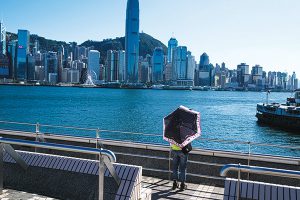The reduction in Hong Kong’s mandatory hotel quarantine period to three days from seven will come as a welcome relief to many in a pandemic-weary population. Whether it will do much to revive the financial centre’s international competitiveness is far more doubtful. In a world where most of its rivals abandoned Covid curbs months ago, the city still looks like a global outlier stuck in a time warp.
It might seem churlish to gripe about a policy step that will have had many people cheering, particularly if they are returning to Hong Kong soon or currently planning a trip out. Three days is easier to bear than seven, which in turn is better than 14 — the required stay until April 1 this year — as well as being cheaper.
The trouble is that retaining any quarantine period at all keeps travellers trapped in a morass of associated logistical headaches.
It’s little surprise, then, that business groups responded negatively to the latest announcement. They have pushed the government for months to scrap quarantine requirements altogether. The British Chamber of Commerce said the relaxation was unlikely to lead to a broader revival in business and tourist travel. Its German counterpart pointed out that provisions allowing travellers who contracted Covid in Hong Kong to be sent to an isolation centre remained a disincentive. The city built its prosperity and hub role on openness and connectivity; it’s hard to see what Hong Kong’s value proposition is if it remains more difficult to travel to than almost anywhere else in the world.
The restrictions might be easier to accept if there
were indisputable medical grounds for keeping them. That’s not the case. As Covid-19 has spread and mutated, strains of the disease have become increasingly transmissible and at the same time less lethal. As Ben Cowling, professor of epidemiology at the University of Hong Kong, has pointed out, the purpose of the inbound quarantine requirements is to keep new strains out of Hong Kong. They have failed at this.
The travel measures aren’t “doing us any good at the moment in terms of preventing Covid getting into the community again,†Cowling told Bloomberg Television back in May. He warned: “That’s going to happen sooner or later.â€
Indeed, it did. Hong Kong is back to reporting more than 4,000 cases a day, yet the number of deaths has remained low and officials are confident enough (or worried enough about the economy) to push through this easing of controls. They are right to acknowledge that conditions have changed. When the Omicron strain got into Hong Kong earlier this year, cases and deaths spiked, largely because the city had failed to adequately vaccinate its vulnerable elderly population. As of late February, only 58% of residents aged 70-79 had received two doses of vaccine, and a mere 29% of over-80s. These percentages are now up to 80% and 66%.
In a sense, Hong Kong finds itself in the worst of both worlds, trapped in a halfway house with quarantine and other restrictions that sap the city’s business and social vitality yet are inadequate to keep Covid out. There’s little mystery about why. China is wedded to Xi Jinping’s dynamic zero-Covid strategy, and Hong Kong’s leaders have been duty-bound to fall in line behind the policy, however ill-suited it may be to the city’s own needs and circumstances. There are political constraints on Hong Kong’s ability to move in a more pragmatic direction, especially when China is again resorting to its favored tactic of lockdowns to suppress an outbreak in Hainan island.
This raises the question of why the city has been allowed to relax the quarantine requirement to the extent it has. China may have felt the need to hand a morale-booster to its handpicked Chief Executive John Lee, who has drawn equal record-low poll ratings for a new Hong Kong leader since taking over last month.
That, at least, would be a cause for optimism, suggesting that the latest change may be a step towards ditching all quarantine requirements. Time is of the essence. Singapore, London, New York and others aren’t standing still. The longer Hong Kong waits, the further it will fall behind.
—Bloomberg
Matthew Brooker is a Bloomberg Opinion columnist covering finance and politics in Asia. A former editor and bureau chief for Bloomberg News and deputy business editor for the South China Morning Post, he is a CFA charterholder
 The Gulf Time Newspaper One of the finest business newspapers in the UAE brought to you by our professional writers and editors.
The Gulf Time Newspaper One of the finest business newspapers in the UAE brought to you by our professional writers and editors.

